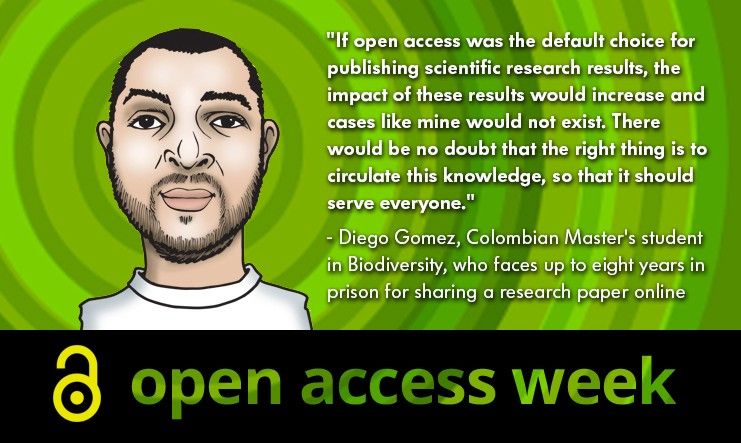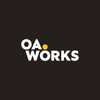Support Diego Gomez: An Update
22 June 2015
22 June 2015
Last Summer, we learnt about the case of Diego Gomez. Diego Gomez, a Colombian graduate student, currently faces up to eight years in prison for doing something thousands of researchers do every day: posting research results online for those who would not otherwise have a way to access them.
I want to support Diego
Diego has posted a letter on Fundacion Karisma’s website informing us that his trial begins next week on 30th June. The full text of Diego’s letter is posted below. Ahead of his case, show your support for Diego by signing and sharing the petition.

(Photo Credit: Electronic Frontier Foundation. CC-BY
I’m ready to sign.
Diego’s Letter
Costa Rica, June 2015
In July 2014 I wanted to bring attention upon the case I was facing. A year has passed and because of your support, there are more of us who think that sharing can’t be considered a crime in Colombia, nor anywhere else in the world. In this time, the support received from different people and organizations has opened the debate about how the lack of balance in copyright laws may affect anybody, and thus is a matter that concerns everybody.
Thanks for helping me telling what’s going on
My case has had an important media coverage which has been broader than expected. My case has been documented by media such as Newsweek and The Guardian. In Colombia it was covered by Caracol, BluRadio,El Espectador, Semana, Enter.co and Las 2 orillas. They made all those interviews and opinion editorials because of the lack of precedents in prosecuting someone who shared knowledge through Internet not for money but for the sake of knowledge itself. This coverage has been interesting since it allowed to reflect on how current laws ignore the transformations the Internet as a tool for creation, production and distribution of knowledge has caused.
Several organizations around the world such as Fundacion Karisma from Colombia, the Electronic Frontier Foundation (EFF) form United States, Creative Commons, Internet Archive, Kno wledge Ecology International,Open Access Button, Derechos Digitales, Open Coalition, Open Knowledge, The Right to Research Coalition,Open Media, Fight for the Future, USENIX, Public Knowledge and Web we Want, have brought attention upon my case through campaigns, reports and all kind of efforts supporting the importance of access to knowledge and talking about the particular characteristics of scientific knowledge and its purpose for society. Those campaigns are CompartirNoEsdelito, YoComparto y “Unámonos para promover el acceso abierto en todo el mundo” [Let’s unite to promote open access around the world] to which many of you have joined.
My case was also one of the discussion topics in OpenCon, an event for students, new researchers and scholars. I also presented it in workshops and discussion forums such as the one opened byUniversidad del QuindÃo, my alma mater, an institution that has supported me through its Virtualization Unit and the show Radio Mutantes of UFM stereo.
Recently, one of the s upporting organizations, the Electronic Frontier Foundation, published the Special Report 404 in which they analyze my case, amongst others, in light of the pressure exerted to countries like Colombia by the Special Report 301 prepared by USTR of United States. EFF’s Report shows that while Report 301 seeks to reinforce legal systems in favor of copyright holders, cases like mine proves the need of greater balance in favor of public interest.
I am grateful to all of you for the time you have spent sharing the messages of the campaigns through social networks but also talking about my case with family and friends, because it shows that there are lots of people like us who believe that a society may use a disruptive technology like Internet in benefit of education, access to science and culture; that sharing is not a crime and that it cannot be considered a crime against authors.
What about the criminal process?
Because many people showed interest in knowing the state criminal process against me, I want to tell you that this process is slow and not much has happened since the last preparatory hearing in which the prosecutor announced the materials they want to introduce as evidence into the process.
That trial was scheduled for November of 2014 but it was cancelled because of the judiciary strike. I am currently living in Costa Rica because I’m finishing my master’s degree on Wildlife conservation and soon I’ll be presenting my defense of the corresponding thesis. Given that I am about to return to Colombia and the new date for the trial was fixed to April of 2015, the Judge accepted my lawyer’s request for a postponement, so the trial will be held in June 30 of 2015, and I will be present.
During the trial we will introduce evidence and documents that support my innocence. I hope that the judiciary system understand that I used the document for academic purposes and my actions were never motivated by money. I trust the judiciary system and I know my case still can resort to many legal recourses, I’ll keep you informed.
Again, I’d like to say thanks to all of you for the support you have offered me and to tell you that today, more than ever, I’m convinced that “if open access was the default, cases like mine were obsolete”. I want to invite you to keep supporting initiatives in favor of open access to avoid bringing the risk of punishment upon researchers and scholars that share knowledge in the digital age.
Thanks for believing in CompartirNoEsDelito (Sharing Is Not A Crime)
Diego A. Gomez Hoyos

